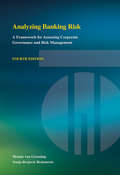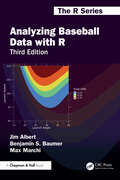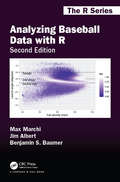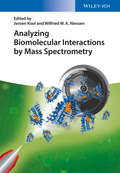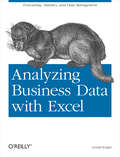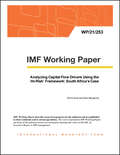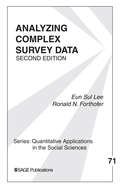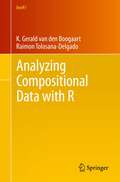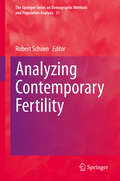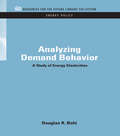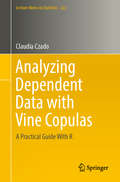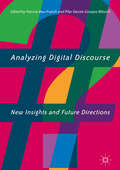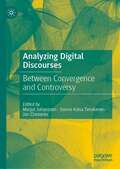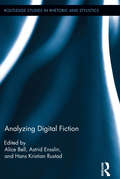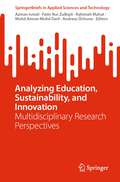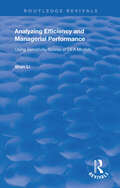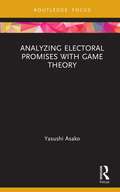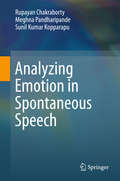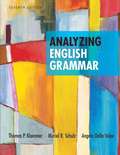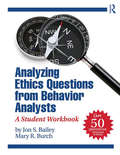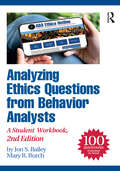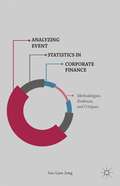- Table View
- List View
Analyzing Banking Risk: A Framework for Assessing Corporate Governance and Risk Management
by Hennie van Greuning Sonja Brajovic BratanovicAnalyzing Banking Risk: A Framework for Assessing Corporate Governance and Risk Management provides a comprehensive overview of topics focusing on assessment, analysis, and management of financial risks in banking. The publication emphasizes risk management principles and stresses that key players in the corporate governance process are accountable for managing the different dimensions of financial and other risks. This fourth edition remains faithful to the objectives of the original publication. It covers new business aspects affecting banking risks, such as mobile banking and regulatory changes over the past decade—specifically those related to Basel III capital adequacy concepts—as well as new operational risk management topics such as cybercrime, money laundering, and outsourcing. This publication will be of interest to a wide body of users of bank financial data. The target audience includes the persons responsible for the analysis of banks and for the senior management or organizations directing their efforts. Because the publication provides an overview of the spectrum of corporate governance and risk management, it is not aimed at technical specialists of any particular risk management area. *** Hennie van Greuning was formerly a Senior Adviser in the World Bank’s Treasury Unit and previously worked as a sector manager for financial sector operations in the World Bank. He has been a partner in a major international accounting firm and a controller and head of bank supervision in a central bank. Since retiring from the World Bank, he has chaired audit, ethics, and risk committees in various banks and has been a member of operational risk and asset-liability management committees. Sonja Brajovic Bratanovic was a Lead Financial Sector Specialist at the World Bank, after a career as a senior official in a central bank. With extensive experience in banking sector reforms and financial risk analysis, she led World Bank programs for financial sector reforms, as well as development projects. Since her retirement, she has continued as a senior consultant for World Bank development projects in the financial sector, as well as an advisor for other development institutions.
Analyzing Baseball Data with R (Chapman & Hall/CRC The R Series)
by Jim Albert Benjamin S. Baumer Max Marchi“Our community has continued to grow exponentially, thanks to those who inspire the next generation. And inspiring the next generation is what the authors of Analyzing Baseball Data with R are doing. They are setting the career path for still thousands more. We all need some sort of kickstart to take that first or second step. You may be a beginner R coder, but you need access to baseball data. How do you access this data, how do you manipulate it, how do you analyze it? This is what this book does for you. But it does more, by doing what sabermetrics does best: it asks baseball questions. Throughout the book, baseball questions are asked, some straightforward, and others more thought-provoking.”From the Foreword by Tom TangoAnalyzing Baseball Data with R Third Edition introduces R to sabermetricians, baseball enthusiasts, and students interested in exploring the richness of baseball data. It equips you with the necessary skills and software tools to perform all the analysis steps, from importing the data to transforming them into an appropriate format to visualizing the data via graphs to performing a statistical analysis.The authors first present an overview of publicly available baseball datasets and a gentle introduction to the type of data structures and exploratory and data management capabilities of R. They also cover the ggplot2 graphics functions and employ a tidyverse-friendly workflow throughout. Much of the book illustrates the use of R through popular sabermetrics topics, including the Pythagorean formula, runs expectancy, catcher framing, career trajectories, simulation of games and seasons, patterns of streaky behavior of players, and launch angles and exit velocities. All the datasets and R code used in the text are available for download online.New to the third edition is the revised R code to make use of new functions made available through the tidyverse. The third edition introduces three chapters of new material, focusing on communicating results via presentations using the Quarto publishing system, web applications using the Shiny package, and working with large data files. An online version of this book is hosted at https://beanumber.github.io/abdwr3e/.
Analyzing Baseball Data with R, Second Edition (Chapman & Hall/CRC The R Series #14)
by Jim Albert Benjamin S. Baumer Max MarchiAnalyzing Baseball Data with R Second Edition introduces R to sabermetricians, baseball enthusiasts, and students interested in exploring the richness of baseball data. It equips you with the necessary skills and software tools to perform all the analysis steps, from importing the data to transforming them into an appropriate format to visualizing the data via graphs to performing a statistical analysis. The authors first present an overview of publicly available baseball datasets and a gentle introduction to the type of data structures and exploratory and data management capabilities of R. They also cover the ggplot2 graphics functions and employ a tidyverse-friendly workflow throughout. Much of the book illustrates the use of R through popular sabermetrics topics, including the Pythagorean formula, runs expectancy, catcher framing, career trajectories, simulation of games and seasons, patterns of streaky behavior of players, and launch angles and exit velocities. All the datasets and R code used in the text are available online. New to the second edition are a systematic adoption of the tidyverse and incorporation of Statcast player tracking data (made available by Baseball Savant). All code from the first edition has been revised according to the principles of the tidyverse. Tidyverse packages, including dplyr, ggplot2, tidyr, purrr, and broom are emphasized throughout the book. Two entirely new chapters are made possible by the availability of Statcast data: one explores the notion of catcher framing ability, and the other uses launch angle and exit velocity to estimate the probability of a home run. Through the book’s various examples, you will learn about modern sabermetrics and how to conduct your own baseball analyses. Max Marchi is a Baseball Analytics Analyst for the Cleveland Indians. He was a regular contributor to The Hardball Times and Baseball Prospectus websites and previously consulted for other MLB clubs. Jim Albert is a Distinguished University Professor of statistics at Bowling Green State University. He has authored or coauthored several books including Curve Ball and Visualizing Baseball and was the editor of the Journal of Quantitative Analysis of Sports. Ben Baumer is an assistant professor of statistical & data sciences at Smith College. Previously a statistical analyst for the New York Mets, he is a co-author of The Sabermetric Revolution and Modern Data Science with R.
Analyzing Biomolecular Interactions by Mass Spectrometry
by Jeroen Kool Wilfried M. NiessenThis monograph reviews all relevant technologies based on mass spectrometry that are used to study or screen biological interactions in general. Arranged in three parts, the text begins by reviewing techniques nowadays almost considered classical, such as affinity chromatography and ultrafiltration, as well as the latest techniques. The second part focusses on all MS-based methods for the study of interactions of proteins with all classes of biomolecules. Besides pull down-based approaches, this section also emphasizes the use of ion mobility MS, capture-compound approaches, chemical proteomics and interactomics. The third and final part discusses other important technologies frequently employed in interaction studies, such as biosensors and microarrays. For pharmaceutical, analytical, protein, environmental and biochemists, as well as those working in pharmaceutical and analytical laboratories.
Analyzing Business Data with Excel: Forecasting, Statistics, and Data Management
by Gerald KnightAs one of the most widely used desktop applications ever created, Excel is familiar to just about everyone with a computer and a keyboard. Yet most of us don't know the full extent of what Excel can do, mostly because of its recent growth in power, versatility, and complexity. The truth is that there are many ways Excel can help make your job easier-beyond calculating sums and averages in a standard spreadsheet.Analyzing Business Data with Excel shows you how to solve real-world business problems by taking Excel's data analysis features to the max. Rather than focusing on individual Excel functions and features, the book keys directly on the needs of business users. Most of the chapters start with a business problem or question, and then show you how to create pointed spreadsheets that address common data analysis issues.Aimed primarily at experienced Excel users, the book doesn't spend much time on the basics. After introducing some necessary general tools, it quickly moves into more specific problem areas, such as the following:StatisticsPivot tablesWorkload forecastingModelingMeasuring qualityMonitoring complex systemsQueuingOptimizingImporting dataIf you feel as though you're getting shortchanged by your overall application of Excel, Analyzing Business Data with Excel is just the antidote. It addresses the growing Excel data analysis market head on. Accountants, managers, analysts, engineers, and supervisors-one and all-will learn how to turn Excel functionality into actual solutions for the business problems that confront them.
Analyzing Capital Flow Drivers Using the ‘At-Risk’ Framework: South Africa’s Case (Imf Working Papers)
by Rohit Goel and Ken MiyajimaA report from the International Monetary Fund.
Analyzing Complex Survey Data
by Dr Ronald N. Forthofer Eun Sul LeeThis book examines ways to analyze complex surveys, and focuses on the problems of weights and design effects. This new edition incorporates recent practice of analyzing complex survey data, introduces the new analytic approach for categorical data analysis (logistic regression), reviews new software and provides an introduction to the model-based analysis that can be useful analyzing well-designed, relatively small-scale social surveys.
Analyzing Compositional Data with R (Use R!)
by K. Gerald van den Boogaart Raimon Tolosana-DelgadoThis book presents the statistical analysis of compositional data sets, i.e., data in percentages, proportions, concentrations, etc. The subject is covered from its grounding principles to the practical use in descriptive exploratory analysis, robust linear models and advanced multivariate statistical methods, including zeros and missing values, and paying special attention to data visualization and model display issues. Many illustrated examples and code chunks guide the reader into their modeling and interpretation. And, though the book primarily serves as a reference guide for the R package "compositions," it is also a general introductory text on Compositional Data Analysis. Awareness of their special characteristics spread in the Geosciences in the early sixties, but a strategy for properly dealing with them was not available until the works of Aitchison in the eighties. Since then, research has expanded our understanding of their theoretical principles and the potentials and limitations of their interpretation. This is the first comprehensive textbook addressing these issues, as well as their practical implications with regard to software. The book is intended for scientists interested in statistically analyzing their compositional data. The subject enjoys relatively broad awareness in the geosciences and environmental sciences, but the spectrum of recent applications also covers areas like medicine, official statistics, and economics. Readers should be familiar with basic univariate and multivariate statistics. Knowledge of R is recommended but not required, as the book is self-contained.
Analyzing Consumer Perceptions
by Robert J. DolanDescribes the perceptual mapping techniques in a non-technical fashion. The procedure is useful for the depiction of the structure of the market. Discusses alternative methods, presents examples of each, and shows how the maps can be used in marketing decision making.
Analyzing Consumer Preferences
by Robert J. DolanPresents a non-traditional description of the conjoint analysis methodology. Discusses the process by which a study is done and cites areas of application.
Analyzing Contemporary Fertility (The Springer Series on Demographic Methods and Population Analysis #51)
by Robert SchoenThis edited volume offers state-of-the-art research on the dynamics of contemporary fertility by examining the implications of the economic and social forces that are driving the rapid change in fertility behavior, and the changing context, determinants, and measurement of contemporary human reproduction. The volume explores new theoretical avenues that seek to incorporate uncertainty, examine social contagion effects, and explain the rise in childlessness. Reproductive attitudes are re-examined in chapters that deal with models of parenthood and with the persistence of race-ethnic-nativity differences. A new and important subject of multi-partner fertility is also described by examining it in the context of total fertility and from the usually neglected perspective of men. The impact of divorce on fertility, the measurement of childlessness and the postponement of first births, developments in assortative mating and fertility, and current patterns of interracial fertility are also addressed in this volume. By combining up-to-date research spanning the entire field to illuminate contemporary developments, the book is a valuable source for demographers, sociologists, economists, and all those interested in understanding fertility in today's world.
Analyzing Demand Behavior: A Study of Energy Elasticities (RFF Energy Policy Set)
by Douglas R. BohiFirst Published in 2011. Routledge is an imprint of Taylor & Francis, an informa company.
Analyzing Dependent Data with Vine Copulas: A Practical Guide With R (Lecture Notes in Statistics #222)
by Claudia CzadoThis textbook provides a step-by-step introduction to the class of vine copulas, their statistical inference and applications. It focuses on statistical estimation and selection methods for vine copulas in data applications. These flexible copula models can successfully accommodate any form of tail dependence and are vital to many applications in finance, insurance, hydrology, marketing, engineering, chemistry, aviation, climatology and health.The book explains the pair-copula construction principles underlying these statistical models and discusses how to perform model selection and inference. It also derives simulation algorithms and presents real-world examples to illustrate the methodological concepts. The book includes numerous exercises that facilitate and deepen readers’ understanding, and demonstrates how the R package VineCopula can be used to explore and build statistical dependence models from scratch. In closing, the book provides insights into recent developments and open research questions in vine copula based modeling.The book is intended for students as well as statisticians, data analysts and any other quantitatively oriented researchers who are new to the field of vine copulas. Accordingly, it provides the necessary background in multivariate statistics and copula theory for exploratory data tools, so that readers only need a basic grasp of statistics and probability.
Analyzing Determinants of Inflation When There Are Data Limitation: The Case of Sierra Leone
by Ken Miyajima Jan Gottschalk Kadima KalonjiA report from the International Monetary Fund.
Analyzing Digital Discourse: New Insights and Future Directions
by Pilar Garcés-Conejos Blitvich Patricia Bou-FranchThis innovative edited collection presents new insights into emerging debates around digital communication practices. It brings together research by leading international experts to examine methods and approaches, multimodality, face and identity, across five thematically organised sections. Its contributors revise current paradigms in view of past, present, and future research and analyse how users deploy the wealth of multimodal resources afforded by digital technologies to undertake tasks and to enact identity. In its concluding section it identifies the ideologies that underpin the construction of digital texts in the social world. This important contribution to digital discourse studies will have interdisciplinary appeal across the fields of linguistics, socio-linguistics, pragmatics, discourse analysis, gender studies, multimodality, media and communication studies.
Analyzing Digital Discourses: Between Convergence and Controversy
by Marjut Johansson Sanna-Kaisa Tanskanen Jan ChovanecThis book contributes to the scholarly debate on the forms and patterns of interaction and discourse in modern digital communication by probing some of the social functions that online communication has for its users. An array of experts and scholars in the field address a range of forms of social interaction and discourses expressed by users on social networks and in public media. Social functions are reflected through linguistic and discursive practices that are either those of ‘convergence’ or ‘controversy’ in terms of how the discourse participants handle interpersonal relations or how they construct meanings in discourses. In this sense, the book elaborates on some very central concerns in the area of digital discourse analysis that have been reported within the last decade from various methodological perspectives ranging from sociolinguistics and pragmatics to corpus linguistics. This edited collection will be of particular interest to scholars and students in the fields of digital discourse analysis, pragmatics, sociolinguistics, social media and communication, and media and cultural studies.
Analyzing Digital Fiction: Analyzing Digital Fiction (Routledge Studies in Rhetoric and Stylistics)
by Astrid Ensslin Alice Bell Hans Kristian RustadWritten for and read on a computer screen, digital fiction pursues its verbal, discursive and conceptual complexity through the digital medium. It is fiction whose structure, form and meaning are dictated by the digital context in which it is produced and requires analytical approaches that are sensitive to its status as a digital artifact. Analyzing Digital Fiction offers a collection of pioneering analyses based on replicable methodological frameworks. Chapters include analyses of hypertext fiction, Flash fiction, Twitter fiction and videogames with approaches taken from narratology, stylistics, semiotics and ludology. Essays propose ways in which digital environments can expand, challenge and test the limits of literary theories which have, until recently, predominantly been based on models and analyses of print texts.
Analyzing Education, Sustainability, and Innovation: Multidisciplinary Research Perspectives (SpringerBriefs in Applied Sciences and Technology)
by Andreas Öchsner Azman Ismail Mohd Amran Mohd Daril Fatin Nur Zulkipli Rahimah MahatThis book describes a diverse array of studies unravelling the intricate interplay of education, sustainability, and organizational dynamics. From innovative teaching methodologies to sustainability trends and the pandemic's impact, this compendium offers a rich tapestry of insights. This book traverses through a compendium of studies that intricately dissect the synergy between education, sustainability, and organizational dynamics. This book is ideal for academics, practitioners, and curious minds seeking a deeper understanding of these vital contemporary forces.
Analyzing Efficiency & Managerial Performance: Using Sensitivity Scores of DEA Models
by Shan LiThis study was initially the author’s Ph.D dissertation written at the University of Texas at Austin in 1995 entitled “A New Approach to Sensitivity Analysis of the DEA Models and their Applications to Ranking and Productivity Growth.” An updated preface and a general index were added for this book which was originally published in 1996. The primary objective of this study is to demonstrate a new method available to management scientists for evaluating the organizational efficiency performance and analyzing how stable the evaluations are to the sample data collections.
Analyzing Electoral Promises with Game Theory (Routledge Focus on Economics and Finance)
by Yasushi AsakoElectoral promises help to win votes and political candidates, or parties should strategically choose what they can deliver to win an election. Past game-theoretical studies tend to ignore electoral promises and this book sheds illuminating light on the functions and effects of electoral promises on policies or electoral outcomes through game theory models. This book provides a basic framework for game-theoretical analysis of electoral promises. The book also includes cases to illustrate real life applications of these theories.
Analyzing Emotion in Spontaneous Speech
by Sunil Kumar Kopparapu Rupayan Chakraborty Meghna PandharipandeThis book captures the current challenges in automatic recognition of emotion in spontaneous speech and makes an effort to explain, elaborate, and propose possible solutions. Intelligent human-computer interaction (iHCI) systems thrive on several technologies like automatic speech recognition (ASR); speaker identification; language identification; image and video recognition; affect/mood/emotion analysis; and recognition, to name a few. Given the importance of spontaneity in any human-machine conversational speech, reliable recognition of emotion from naturally spoken spontaneous speech is crucial. While emotions, when explicitly demonstrated by an actor, are easy for a machine to recognize, the same is not true in the case of day-to-day, naturally spoken spontaneous speech. The book explores several reasons behind this, but one of the main reasons for this is that people, especially non-actors, do not explicitly demonstrate their emotion when they speak, thus making it difficult for machines to distinguish one emotion from another that is embedded in their spoken speech. This short book, based on some of authors' previously published books, in the area of audio emotion analysis, identifies the practical challenges in analysing emotions in spontaneous speech and puts forward several possible solutions that can assist in robustly determining the emotions expressed in spontaneous speech.
Analyzing English Grammar
by Thomas P. Klammer Muriel R. Schulz Angela Della VolpeWhile drawing upon traditional, structural and transformational grammatical theory, the primary purpose of this book is to provide sound pedagogical grammar instruction. Taking an eclectic approach, this effective learning tool is designed to support and assist learning about the structure of English. Unlike similar books, Analyzing English Grammar directly addresses its audience with understandable language and clear explanations. From cover to cover, it models the techniques of step-by-step linguistic analysis that the authors teach in their own classes. Numerous exercises help readers move from mastering clear, prototypical cases toward critical analysis of the more complex and borderline fuzzy grammar examples that characterize actual language. Includes the conventions of Standard English in a context of regional, social, and stylistic variation. Grammatical concepts are applied to practical writing problems.
Analyzing Ethics Questions from Behavior Analysts: A Student Workbook
by Jon S. Bailey Mary R. BurchSupplementing the best-selling textbook, Ethics for Behavior Analysts, this book analyzes over 50 original and up-to-date ethics cases recently faced by behavior analysts. The workbook provides "solutions" to each question written by the most expert professionals in the field using the Behavior Analyst Certification Board® Ethics Code. Covering all ten sections of the code and designed to allow the reader to see the original question, respond given their knowledge of the Code, and then compare their answers with the authors’ answers at the back of the book, Jon S. Bailey and Mary R. Burch provide the necessary guided practice for both students and clinicians to improve ethical competency in behavior analysis.
Analyzing Ethics Questions from Behavior Analysts: A Student Workbook
by Jon S. Bailey Mary R. BurchSupplementing the best-selling textbook, Ethics for Behavior Analysts, this workbook analyzes over 100 original and up-to-date ethics questions posed by behavior analysts, to the highly regarded ABA Ethics Hotline.This new edition provides solutions to each question using the 2020 Behavior Analyst Certification Board® Ethics Code. Covering all six sections of the new code, it is designed to allow the reader to see the original question, our response, and then compare their answers with the Hotline expert’s answers at the back of the book. Bailey and Burch provide the necessary guided practice for both students and clinicians to improve ethical problem solving and competency in behavior analysis.This book is an invaluable resource for all budding behavior analysts and their teachers.
Analyzing Event Statistics In Corporate Finance
by Jau-Lian JengAnalyzing Event Statistics in Corporate Finance provides new alternative methodologies to increase accuracy when performing statistical tests for event studies within corporate finance. In contrast to conventional surveys or literature reviews, Jeng focuses on various methodological defects or deficiencies that lead to inaccurate empirical results, which ultimately produce bad corporate policies. This work discusses the issues of data collection and structure, the recursive smoothing for systematic components in excess returns, the choices of event windows, different time horizons for the events, and the consequences of applications of different methodologies. In providing improvement for event studies in corporate finance, and based on the fact that changes in parameters for financial time series are common knowledge, a new alternative methodology is developed to extend the conventionalanalysis to more robust arguments.
